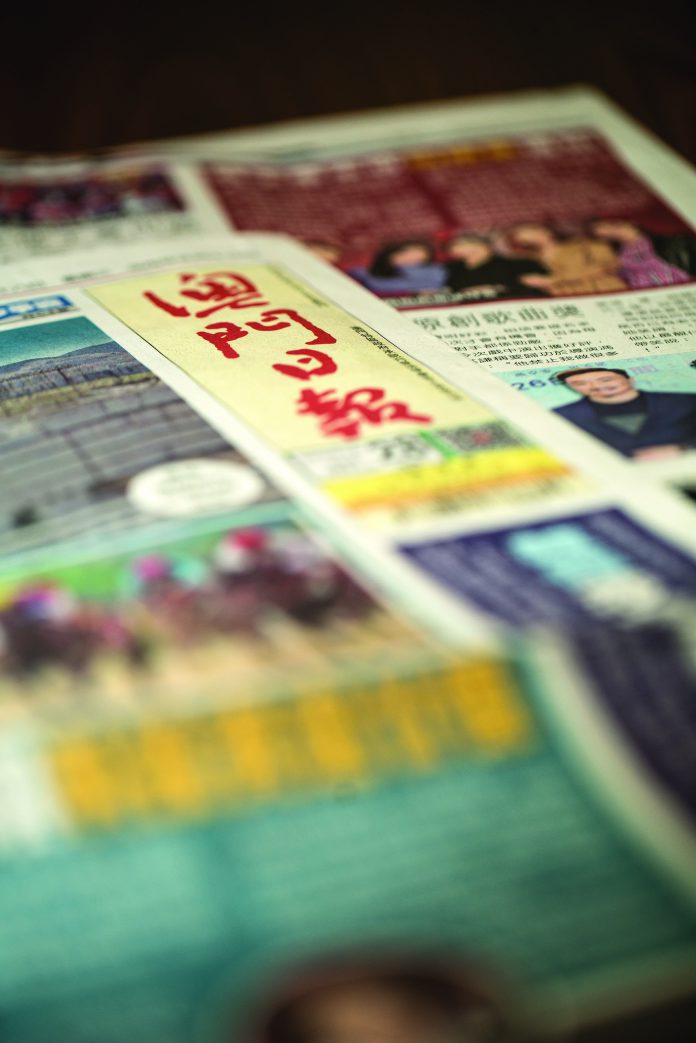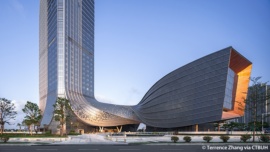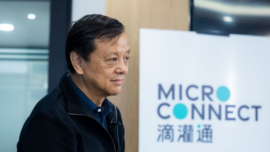The author of the title sentence of this piece is Dr. Tam Chi Keung, Professor at the Faculty of Humanities and Arts, Macau University of Science and Technology.
Three years ago this former journalist surprised the audience of an open seminar when he stated precisely that “Macau has no authentic Chinese news media.”
Tam Chi Keung (also known as Camoes Tam) explains to Macau Business that “this sentence means all of the Macau Chinese news media, actually, are the propaganda organ (tongue) of the Chinese Communist Party and PRC Government after the ‘12-3 Riot of Macau’, which occurred on December 3, 1966.”
Camoes Tam studied the differences between the Hong Kong and Macau Chinese news media, and their influence on the Hong Kong and Macau people’s thinking and political identity, concluding that “by Western professional standards, because of the loss of independence and objectivity these news media are not authentic news media.”
Macao has 13 daily newspapers published in Chinese, but – as you can see – the generalisation made by the MUST Professor is absolute.
“All of the Macau Chinese news media, actually, is the propaganda organ (tongue) of the Chinese Communist Party and PRC Government” – Camoes Tam
 Still, Camoes Tam is primarily thinking about Macau Daily News (Ou Mun Iat Pou/Aomen Ribao), the newspaper – even without control of print runs and sales – that will account for about 90 per cent market share.
Still, Camoes Tam is primarily thinking about Macau Daily News (Ou Mun Iat Pou/Aomen Ribao), the newspaper – even without control of print runs and sales – that will account for about 90 per cent market share.
In 2011, Lisa Xiaoqin, Professor in the Communication Department of the University of Macau, published a Preliminary Study on the Surveillance Function of Chinese Media in Macao, concluding in the same vein: the media in Macau acts mainly as a government spokesman rather than a watchman.
“Ou Mun Iat Pou is the largest media [outlet] in Macau; the case is more significant than other media. Even other media play mainly as a watchman, the impact is limited also,” Ms. Xiaoqin told Macau Business, adding that the role played by the other Chinese-language newspapers is “minor with insignificant impact.”
Another finding from this researcher is that “the information function and surveillance function of media in Macau are limited and the gap between expectations and perceived media functions by the public is quite wide.”
“Generally, the public perceive that the legacy mass media, especially newspapers, should have an information, surveillance, education and entertainment function,” explains Xiaoqin. “There are always some gaps between the public’s expectations (what they should be/should do) and the media’s actual performance (what they actually do). The performance of Macau media is also the same. According to the research findings and other research on Macau media we can say that the first two functions of media are limited. Anyway, the conclusion here needs empirical data as we have conducted in other places to support it which will be more convincing.”
There is, in fact, a broad consensus, especially among researchers studying these subjects, on the characteristics of the Chinese language press in Macau.
“The dominant influence of his [the Chief Executive’s] Administration is further buttressed by the absence of vigorous scrutiny from the local media. The local press is dominated by the pro-Beijing, pro-regime Macau Daily News,” states Herbert S. Yee, former UMAC Professor. The author of The Theory and Practice of ‘One Country, Two Systems’ in Macao also understands that “a handful of minor local Chinese newspapers, with the exception of the casino interests-backed Citizens Daily, cannot survive without government subsidies.”
Another local researcher, Bill Chou (now in a Hong Kong university), writes: “Unlike their counterparts in Hong Kong, the mass media in Macau does not scrutinise either the Macau SAR or (in particular) the Chinese Government; it is not uncommon for the media to report the governments’ official press releases.”
Bill Chou underlines the fact that Macau’s only terrestrial television channel and the most popular radio channel are owned and funded by the government-run Teledifusão de Macau (TDM) “neither [of which] are critical of the government,” he states.
Fourth power
Macau Daily News was founded in 1958 by Ke Ping, the Communist Party of China leader in Macau at that time.
Whether during the Portuguese Administration or after the transition, it has maintained the largest circulation in the city, but perhaps it could be said that it was more influential up to 1999 than it is today.
In those years Ou Mun acted as the only voice authorised by Beijing within Macau.
Its power was so significant that it had the luxury of ignoring the orders of censorship imposed by the dictatorial regime in force in Portugal until 1974.
But the best example that can be given is when it went so far as to impose conditions upon the Macau Government, which accepted them (in the wake of the events of the 1966 Cultural Revolution).
To call it, in this context, the fourth power is not an exaggeration.
Popular phone-in
“The phone-in morning show on Radio Macau is a unique and valuable plural and open forum in Macau,” praises José Carlos Matias, a Macau-based journalist and researcher.
The Macau Portuguese and English Press Association president points out that the programme “was launched before the handover and has remained a bulwark of public opinion and critical and diverse views. It should be treasured and nurtured,” he believes.
For more than 20 years, the programme – moderated from the outset by Iu Veng Ion and Cheang Kok Keong – has been represented as an area of freedom and debate, bringing many protagonists, including political decision-makers, into contact with the population. Some more hot ’emissions’ became famous.
Still, it was not a problem-free course.
In 2012, it was announced that the programme would not continue the following year, and only popular pressure kept it going.
That same year Iu Veng Ion and Cheang Kok Keong abandoned the transmissions.
How is this longevity explained? On the one hand, it is the most popular programme of the Chinese channel of Radio Macau (Ou Mun Tin Toi); on the other hand, there was always the care, as the first moderators recognised at the time of leaving, “to avoid comments that could be controversial.”
Hugo Pinto, a Portuguese journalist working on the Portuguese language radio channel, tells Macau Business that the programme “is popular, I believe, because it opens the possibility for the general public to interact directly with government officials on various topics that mark the present, with the immediacy and simplicity that radio provides.”
Pinto underlines, however, that “in Macau, where there is freedom of expression, there are other forums for this. In the Chinese channel of public television, for example, there is a similar but weekly programme, which follows a similar model, in which a current topic is discussed with representatives of associations, experts, directors of the Administration or Government, deputies, and with an audience that can participate expressing opinions and posing questions.”
























